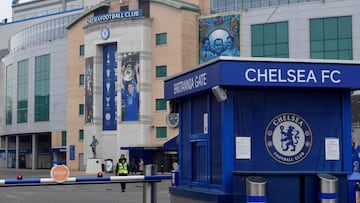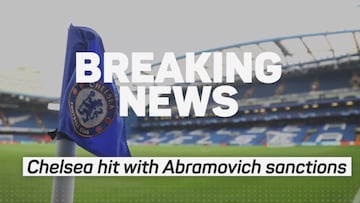What do Abramovich sanctions mean for Chelsea FC?
The threat had been made, and on Thursday morning the announcement came from the British government that Roman Abramovich was being hit hard.



Russian President Vladimir Putin continues his unprovoked and illegal invasion of Ukraine. Sanctions are one of the tools being used to try to change his mind, both those that can hit his finances directly, those that can hurt Russia's economy and those on Russian oligarchs who have made their fortunes thanks to their close ties with the nation's leader.
On Thursday, one of those influential players, billionaire Roman Abramovich, has had his UK assets frozen with immediate effect. And as owner of Premier League club Chelsea, this could have significant ramifications that their fans will be keen to know. We take a look.
You may also be interested in:
- Meet the Champions League quarter finalists
- Cheers and boos for Mbappé
- Livid Al-Khelaifi barges into referee's dressing room post-game
- Hat-trick hero Benzema puts Madrid into quarters
- Real Madrid qualify, here's the Champions League draw details
What do Abramovich sanctions mean for Chelsea FC?
Back in 2003, Abramovich took over ownership of Chelsea FC and success on the pitch quickly followed as some of the world's best players were brought in thanks to his seemingly unmatched resources. Fans were in dreamland, and there was little desire to question the roots of this glory. Recent developments, however, may be part of their long-predicted nightmare.
Following noises from the UK government about potential sanctions - almost as though they wanted to warn certain people in the line of fire of what lay ahead - Abramovich announced that he was putting the club up for sale. As discussions continue with potential buyers, all his UK assets were frozen but Chelsea FC have been told that the club can still operate under a special license and the club are in discussions about what options are available to them.
Shirt sponsors Three have said they are “reviewing the situation and are in discussions with Chelsea FC” following the announcement that Chelsea owner Roman Abramovich has been sanctioned by the UK government.
— The Athletic UK (@TheAthleticUK) March 10, 2022
Selling Chelsea
The sale of the London club was initially unclear but the government has since confirmed that it is not currently possible and that a new license would have to be obtained first. One factor that was clear from the start was that Abramovich, or the Russian state, could not receive any money from a sale. There is also a provision that prevents any UK citizen or company from doing business with him or Chelsea, although those expected to be buying the club were expected to be from overseas.
Chelsea games
The club is allowed to continue playing games (in all competitions) but is unable to sell any more match-day tickets. Only season ticket holders will be allowed to attend home matches for the foreseeable future. Costs at Stamford Bridge are permitted up to £500,000 per game while the club can pay travel costs of up to £20,000 per away game. This will be more of a challenge for European trips, with a Champions League game in Lille coming up.
Paying and signing players and staff
The current squads of men and women, plus coaching and other staff, can continue to be paid (although depending what happens in the coming weeks club funds will diminish given the sanctions). No new players can be brought into the club under the special license and no renewal of contracts can be made.
It's worth noting that Cesar Azpilicueta, Andreas Christensen and Antonio Rudiger are out of contract at the end of this season.
What UK assets does Roman Abramovich have?
Related stories
According to the British goverment, "Roman Abramovich has stakes in steel giant Evraz, Norilsk Nickel and owns Chelsea FC. He sold a 73% stake in Russian oil firm Sibneft to state-owned gas titan Gazprom for 9.87 billion pounds in 2005.
"His net worth is an estimated 9.4 billion pounds. He is one of the few oligarchs from the 1990s to maintain prominence under Putin. None of our allies have yet sanctioned Abramovich."

